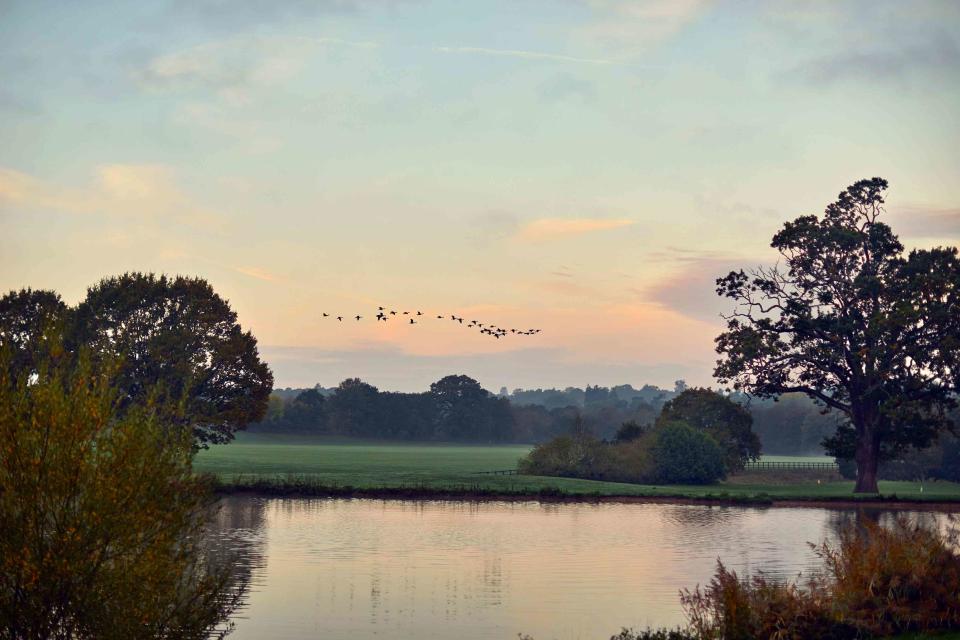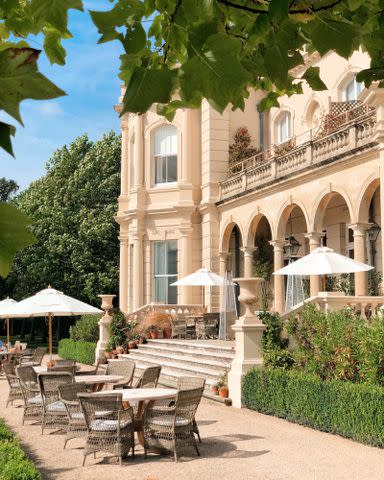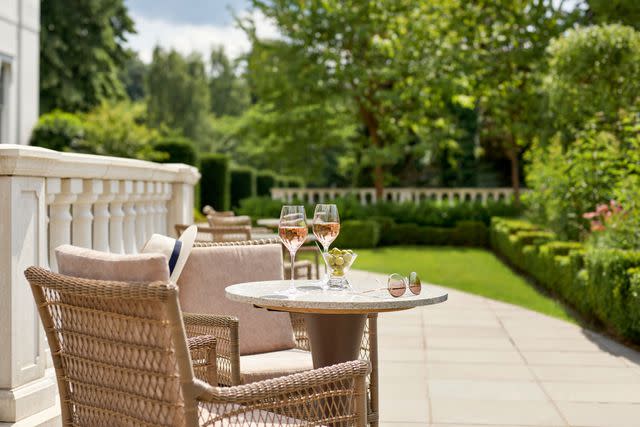Take It From Us — Plan a Trip to English Wine Country Before It Gets Too Instagram-friendly
- Oops!Something went wrong.Please try again later.
Come for the bubbly, stay for (or in) a picturesque boutique hotel.

Courtesy of Coworth Park
It’s not difficult for a tired, over-stimulated New Yorker to find a compelling reason to visit the English countryside. On a recent trip, I found myself marveling at how pleasant it was to be in a setting that felt bucolic without succumbing to the somber, beige minimalism that’s become a bit too common (at least for my taste) in rural escapes across the states. Here, there are boutique guesthouse-style accommodations that feel like they might as well be your chic, unmarried aunt’s vacation home, scenic (albeit shockingly narrow) roads to drive along, and there’s wine — really good wine, especially sparkling.
With a chalk-heavy soil composition that’s virtually identical to that of Champagne, southeast England (which includes the counties of Kent, East and West Sussex, Surrey, and Hampshire) has a natural leg up when it comes to producing bright, crisp bubbles. Production is growing, and historical data from Wines of Great Britain shows that the number of active vineyards in the country skyrocketed by 113% from 1989 to 2022, with total planted acres up by almost 350% across the same period.
But even that magnitude of growth doesn’t mean the challenges facing English sparkling are a thing of the past. Although the past few years have notably been some of the warmest (and best for grape-growing) on record, it’s still no small feat for England to shake its reputation for having famously cold, inhospitable weather. Coupled with the reality that many consumers continue to look to Prosecco for affordable bubbly and Champagne for splurging, as well as the unique obstacle of being a relatively young wine region in 2023, it’s easy to see why a growing chorus of winemakers, distributors, hoteliers, and restaurateurs are singing the praises of wine tourism. Not in a few years, and not in an aspirational way — but now, and with some real urgency.
Going the distance
One of the most significant investments in English wine tourism comes from hotelier Robin Hutson, who founded THE PIG hotels in 2011. With locations in close proximity to wineries in Hampshire, Kent, and West Sussex, the brand site shares a focus on “championing vineyards that are local to our hotels;” Hutson is also a major investor in Sugrue South Downs wines, a label from Dermot Sugrue, formerly the head winemaker at Nyetimber and Wiston Estate. “Unfortunately, successive UK governments have shown a lack of sustained commitment to tourism and hospitality in general,” Hutson says. “Their backing of wine tourism as important for the UK’s incoming tourists will be key to the establishment of the destination.”
No amount of investment can reduce the challenge of sheer mileage between wineries. “Wineries [here] are generally not located side by side as they are in many regions of the world…The geography of these areas can be problematic as many wineries are located in rural, hard to reach areas,” says Gareth Maxwell, who has worked in the English wine industry for over 8 years. Maxwell recently decided to start his own winemaking project, The Heretics. “Private tour operators have started to spring up providing tour services, [and] hopefully this will continue and expand, as drink driving laws are very strict here…hopefully, producers and local hotel networks too will develop closer relationships, and begin singing from the same hymn sheet.”

Courtesy of Beaverbrook
One such operator is Wine Garden of England, which offers tours that include wineries and restaurants throughout Kent; The Pig’s Bridge Park hotel is one of the accommodations recommended on the tour. For those wishing to curate their own luxury trip through wine country, there are several stand-out options: In Ascot, there’s Coworth Park, which has a Michelin starred restaurant, Woven by Adam Smith. Further afield in Leatherhead, Beaverbrook features impeccably appointed rooms decorated by Susie Atkinson, whose eye for whimsical wallpapers and textiles makes every corner of the property feel like a discovery. Beaverbrook’s wine program features a staggering 150 offerings by the glass, with a spotlight on otherwise impossible-to-find bottles secured by the estate’s sommelier and head wine buyer, Giovanni Tallu. “I’ve had the good fortune to visit the world’s best vineyards and meet with owners and growers from Pétrus to Domaine Romanée Conti, just to name a few. I’ve built relationships with suppliers that allow us the opportunity to have the first choice as buyers, securing the best of their varieties and ensuring an ever-evolving exceptional selection for our members and guests,” he says.
The promise of a captive audience
While getting more people to plan a trip remains the ultimate goal, British Airways, the national airline of Great Britain, has been quietly working to raise the region’s winemaking profile from afar.
Related: The Sparkling Wines That Will Get Me Through COVID-19
English sparkling has been available in First Class since 2013, and the airline recently began offering a rotation of producers including Digby Fine English, Wiston Estate, Simpsons, Hattingley, and Balfour to guests flying in Club World, or business class. “The reception from customers has been overwhelmingly positive. For many, it’s the first time they have tasted an English sparkling – and what better place to try it than on a long-haul flight, from the comfort of their seat?” says Master of Wine Tim Jackson, who oversees the beverage program in BA lounges and on flights. He adds that passengers from nationalities aside from Britain frequently express surprise upon discovering that the UK not only makes wine, but that it’s very good. “It’s quickly become one of the most popular items on our menu.”

Courtesy of Coworth Park
Dinner, a show, and some wine
As anyone who’s been to Napa Valley or Champagne can tell you, the road to robust wine tourism is paved with tasting rooms, restaurants, and shopping experiences. At Wiston Estate in Sussex, guests can stop by Chalk restaurant for beautifully curated farm-to-table breakfast, lunch, and dinner; Bolney Wine Estate recently opened its charming, casual Eighteen Acres café, situated conveniently beside a carefully curated vineyard shop that features local charcuterie, spirits, and of course, wines.
These sorts of changes aren’t going unnoticed — according to WineGB, 2022 visitor numbers to vineyards and wineries rose in the United Kingdom by 17% compared to 2021; the same report shows that wine tourism accounts for almost a third of revenue for English winemakers. Major players from outside of the United Kingdom are also taking note; Champagne Taittinger began producing sparkling wine in Kent back in 2015, while Champagne house Louis Pommery acquired land in Hampshire in 2016, having started to produce English sparkling in collaboration with Hattingley just two years earlier. And earlier this year, California giant Jackson Family wines acquired land in the Crouch Valley, a coveted growing region in Essex.
Wine country bells and whistles aside, what gives me the most confidence about England’s future as a wine region in its own right is the sense of pride everyone who touches wine — from harvest volunteers to winemakers — seems to genuinely have about what they’re doing, and why they’re doing it in England. It’s something that’s noticeable in small but rather powerful ways, like on a cheerful manifesto in the winery at Hattingley that reads, “Unapologetically British. ” It’s the ethos behind the first-ever TV advertisement from an English winery (which Maxwell produced) which pokes fun at biased, French notions about English sparkling. “Many consumers would like us to come up with a snappy name [for English sparkling] but that doesn’t feel very British,” Maxwell says. “And not to mention, anything that’s been suggested so far has been quite frankly, rubbish.”
For more Food & Wine news, make sure to sign up for our newsletter!
Read the original article on Food & Wine.

